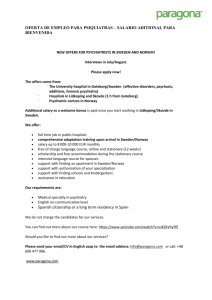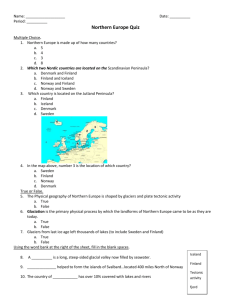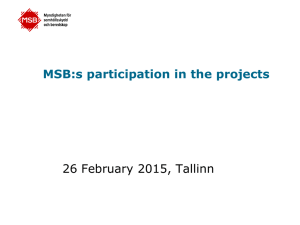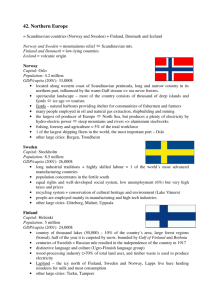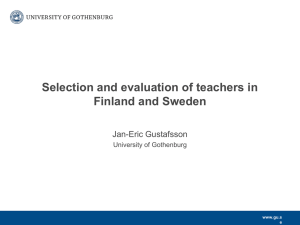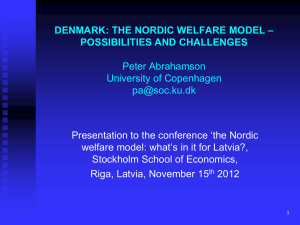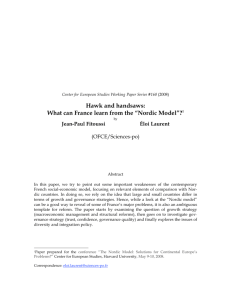Nordic business culture – so similar yet so different
advertisement
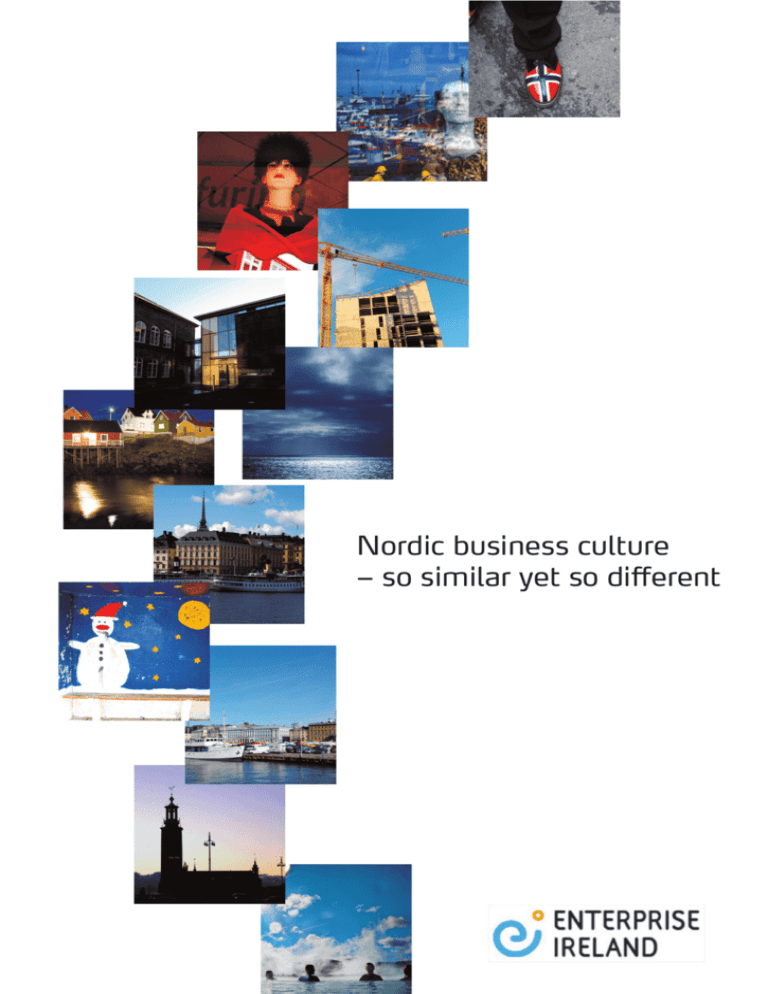
Nordic business culture – so similar yet so different Nordic business culture – so similar yet so different A few common features • The democratic company is generally the ideal in the Nordic countries. Short lines of communication between management and employees. Companies take care of employees – everyone is to feel significant and that their voices are worth listening to. • People in the Nordic countries are characterised by their Lutheran heritage. They are disciplined and have a strong work ethic. • Nordic societies are strongly influenced by the concept of the welfare state. High level of ambition for public social welfare that supports all citizens. Gender equality permeates administration, business culture and relationships between people. All the Nordic countries have high levels of taxation. • Products are remarkably often aimed at qualitative mainstream. This means goods for which there is broad demand and that can be produced in large volumes, but at the same time have high standards in terms of quality and design. • Deliberate and ambitious actions to support sustainable development are integrated at all levels in the business enterprise. Detailed process analyses in terms of energy consumption, raw materials, chemical use, recycling, etc. • Transparency, trust, honesty. In international terms, a very low level of corruption. It is acceptable to treat people to dinner, give simple presents, or possibly a bottle of Irish whiskey, a box of chocolates or something similar. However, not watches, jewellery, luxury trips or such like. • A Nordic handshake is to be firm and fast. A person from a Nordic country is often uncomfortable with cheek kissing and too much hugging. • Generally speaking, the standard of spoken English is very high in the Nordic countries. • The Nordic countries usually top all the world’s ranking lists, regardless of whether these concern welfare, economy, production, gender equality or personal happiness (however this is measured…. ) Nordic business culture – so similar yet so different DENMARK Denmark has a population of 5.5 million (pop. density 129/km2), 1.9 million of which live in and around the capital, Copenhagen. Denmark is the smallest of the Scandinavian countries and by traditionally is a predominantly agricultural country. Apart from oil and natural gas from the North Sea, Denmark has few natural resources of its own. Major trading and maritime enterprises. The Dane is: Danes like: • Good-natured • Open sandwiches for lunch, but watch out for the younger • Individual • Not inclined to take life too seriously and does not overdramatise things – “Take it easy now” is a commonly-used expression • Happy to relax and drink a beer with good friends. Declining an invitation to go out for a couple of beers loses you a lot of points unless you have a very good excuse. Things to remember when doing business with Denmark: • The Danes have a long tradition as a trading nation and generation, which may have become ‘sushified’. • Making good deals. • Danish beer. • Their pleasant capital (unless the person comes from some other place in Denmark). • Modern design. • Weak coffee (but for goodness’ sake don’t tell a Dane that it is weak!). • Their queen, Margrethe. are known to be skilful and tough negotiators that do not Danes don’t like: give in too easily. Absolute top priority for a Dane in a ne- • Foreign beer (strangely enough!). gotiating situation is to maximise benefit on his side of the table. • The Danes are strong nationalists and prefer things to be done in a Danish way. For example, through an exemption they have retained the Danish krona in spite of being a member of the EU, and they have a specifically national debit card (Dankort) that is totally dominant as a method • Excessively strong personal convictions, fanaticism. People can joke about women and feminism, unlike in Sweden where such things are never, NEVER joked about. • Strong coffee. • People trying to educate them. Because it’s impossible. of payment. If you have a normal international card, check The Danes can be proud of: that you can use it before you buy anything. It is not certain • The Little Mermaid and H.C. Andersen. that your card will be accepted. • The Dane’s self-image has a touch of complex to it. The Danes live in a relatively small country that was once larger. Perhaps this explains the very burning ambition to play the leading role on the international arena in all possible situations. Don’t joke about the size of Denmark. The Dane is possibly a smaller brother, but doesn’t like that role and, above all, doesn’t like to be reminded of it. • Despite being a Nordic country, the business culture is • Royal Copenhagen. • LEGO. • Discovery of electromagnetism. • The silent compartment on the train. • Bang & Olufsen. • The cycling culture. • Mærsk. fairly hierarchical. The boss makes the decisions. If a mee- • The best business climate in the world according to the ting goes silent, this means agreement with what is being American business newspaper, Forbes. discussed. Nordic business culture – so similar yet so different FINLAND Finland declared independence from Russia on 6 December 1917, since when this has been the country’s National Day. Consequently, Finland is quite a young country. Its population is 5,315,000 and the population density is 17.1/km2. The capital Helsinki has a population of 1.1 million in its metropolitan region. Forest is Finland’s main resource. Finland is a predominantly industrial country, with the most important sectors being electronics and forestry (paper). Finland is officially bilingual: 91.5% speak Finnish while 5.5 % speak Swedish. The language issue has been controversial throughout the country’s history. The Finn is • Restrained. On the surface. • Intensive. Inside. • Filled with ‘sisu’. This is the usual epithet when Finnish people describe themselves. It can be said to mean fighting spirit, stubbornness, perseverance – does not give up when the going gets tough. Väinö Linna summarised the concept best in the laconic introductory words to the great peasant epic, Högt bland Saarijärvis moar: “In the beginning was swamp, hard work and Jussi.” • Proud of the country. The Finnish civil population suffered badly in both world wars, and there was a lot of economic hardship. During the Cold War, the Russian influence inhibited development. Today, there is justifiable pride in the orderly and economically successful society that has been can perceive them as curt and bad-tempered. This is hopefully (and probably) not the case. The words are particularly important in Finland, and silence can, remarkably enough, be perceived as competency. Finnish people do not like: • Nonchalance and carelessness • Boastfulness • Lack of commitment • Food that is too salty • Empty words Finnish people like: • Sour rye bread • Ice hockey. Especially when Finland crushes Sweden. built up. • The country’s status as a republic. Denmark, Norway and Things to remember when doing business with Finland: • Wife carrying. Running with a woman on your back for • The Finns are hard working. They are brought up in a disciplined knowledge- and performance-oriented school that scores outstanding results in many PISA studies. This affects the business culture – gathering information is taken very seriously, which makes managers knowledgeable and well-prepared to make quick decisions. • The employees show great solidarity with their company as long as the sense of justice, central to Finnish business culture, is satisfied. If small boxes of chocolates are given away as Christmas presents, make sure that everyone gets the best ones. • Finnish people are very punctual and expect the same of the other party. Whatever is said is what applies. Company traditions are important, and people are often a little sceptical about the value of unmotivated reorganisations and modern management methods. • Nature, silence and saunas are important for the Finns. If you’re lucky enough to be invited to a sauna party, enjoy it! • Silence… a Finnish person can be so quiet that people Sweden are monarchies. 253.5 metres as quickly as possible. Minimum weight (of the woman) is 49 kg. Finnish people can be proud of: • Their beautiful lakes. Finland is usually called the country of a thousand lakes. • Their country regularly topping the annual list of the world’s least corrupt countries. • Nokia. • Kalevala, Finland’s ancient national epic poem. • All their racing drivers. Are Finnish people born with their foot on the accelerator pedal? • Iittala, Marimekko. • Father Christmas’s choice of location: Rovaniemi in northern Finland. He has over a million visitors from all over the world every year. • Jean Sibelius. • The written language – it is more similar to the spoken language than any other language in the world. • The sauna of course. NORWAY Norway is an elongated and mountainous country along Scandinavia’s Atlantic coast. For a long time it was under Danish rule but, in 1814, it was forced into a union with Sweden. The country declared independence in 1905. Norway has a population of 4,858,000 and a population density of 12.6/km2. The capital is Oslo and the population of the metropolitan area is 1,208,000. The country is very rich in natural resources – forest, water power, fish and, above all, oil and natural gas in the North Sea – which have made Norway one of the wealthiest countries in the world. The surplus from the oil revenues has been invested in a public fund whose value in 2009 was around EUR 300 billion. The Norwegian language has many dialects and two written languages: Book Language and New Norwegian. The Norwegian is: • Enthusiastic • Positive • Individualistic. This is the result of living in remote mountain values with poor communications. • A nature lover. The Norwegian’s favourite recreational activity is to go out in the countryside, i.e. walking or skiing. Norway is a very mountainous country with large remote areas. It has many fjords – deep inlets of the sea that stretch far inland. • Nationalistic. Visiting Oslo on 17 May when Norwegians celebrate their national day is a magnificent experience. Everyone is out on the main street Karl Johan dressed in the Norwegian colours of red, blue and white. The street is full of waving flags, and marching bands, and everywhere there are streamers and confetti. • Pompous and arrogant. At least, that was the view of historian Saxo Grammaticus, who died at the beginning of the 13 century. • Interested in sport. Norway is very successful at winter sports with world champions in most events. Lillehammer arranged the Winter Olympics in 1994. See the previous point. Things to remember when doing business with Norway: • You are probably dealing with a very strong counterpart. Norway is one of the world’s biggest exporter of oil and natural gas. In 2008 GNP per capita was just over USD 83,000. This can be compared with the figure for the USA, USD 47,000. Income is distributed very evenly and unemployment is the lowest in Europe. If capital is not in short supply, then the labour force is. Norway has significant work force immigration. Because salary levels are high in international terms, it can be difficult to find (and then pay!) skilled workers. • The Norwegian government owns more enterprises than is the case in other European countries. • Norwegians are positive by nature and are more inclined to see opportunities rather than difficulties. This can sometimes mean that details that lead to problems are not spot- ted, leading to friction in the machinery later. • According to certain observers, the high salaries have led to many Norwegians lowering their levels of ambition in terms of work performance and education. But perhaps the observers are just envious. • If you are given boiled cod with red wine, try to look happy. You might just as well get used to it. It is now served at luxury restaurants all over the world. • In 2003, Norway became the first country in the world to introduce legislation about gender quotas on company boards. At least 40% of board members are to be women. Hierarchies are shallow, and employees are on first-name terms with managers. Norwegians do not like: • The EU. It is usually only the Prime Minister who enthuses about membership. • Pettiness. • Pretence. • Advantage through inheritance. But it doesn’t exist in Norway, since there has hardly been any nobility. Norwegians like: • The large expanses. Sea, mountains, forests. • Personalities. At all levels. • Pinnekjøtt (lamb) and rakfisk (trout) – national dishes. • Sweaters (lusekofta) • Hardanger fiddle (folk music instrument). • Fresh air. Norwegians can be proud of: • Greatest freedom of the press in the world. • Edvard Munch and Edvard Grieg. • Statoil. • Lofoten cod and farmed salmon. • North Cape, the most northerly point on the European mainland. • Their maritime traditions. • Norsk Hydro. • Henrik Ibsen. • The landscape. Incredibly beautiful. SWEDEN In terms of both area and population, Sweden is the largest of the Nordic countries. The population is 9,400,000 (population density 21/km2), and the capital is Stockholm with its population of 1,252,000. But Greater Stockholm is a very extensive satellite area with nearly 2 million inhabitants. Sweden has many resources – forest, metal ores, water power – and is a predominantly industrial country. The Swede is: • Rational • Pragmatic • Consensus-oriented • Inclined to watch how everyone else is behaving. Any deviation from the others is embarrassing. • Standing in the way or fiddling with small change is also embarrassing. • Terrified of being embarrassed, standing out from the Swedes do not like: • People trying to push to the front of queues. • Individualism. • Haggling. The price is fixed. • Impractical items and phenomena. • Aggressive people. Swedes like: crowd in a negative way. Hence all the neutral faces. • Ethical regulation systems. Swedes have such high ethi- Things to remember when doing business with Sweden: course, produces only ‘peaceful’ weapons. • Swedes are practical and are looking for a result that has a practical use. Making an agreement that is successful in the long term is more important than a deal that brings shortterm benefits. • An agreement is not primarily about agreeing on overriding principles. An agreement means that the parties agree on the sum of the parts. It is the details that steer the principles, not vice versa. (Or, for the philosophical, Swedes think that induction is more reliable than deduction.) • On the other hand, there are firmly fixed ethical norms – what is said is what applies, solutions must be environmentally sound, safety is prioritised, gender equality, and Systembolaget (the state monopoly for alcohol). • Shallow hierarchies – everyone has the right to express themselves and wants to do so. Decisions are preferably taken by consensus. Silence in a meeting with employees is a sign of dissatisfaction. On the other hand, in private situations, the Swede is often quiet without being dissatisfied. A line in the national anthem is actually, ”You quiet joyful beauty”. • Traditions, ceremonies and formal titles are unimportant. Formal hierarchies too; Swedes are really all friends together. Just look at the signs on IKEA’s toilets: guys and girls. However, there are often also hidden hierarchies that are difficult to break through. And not always so easy to deal with • In Sweden it is important to be, or appear to be, modern; being ”at the forefront” is a commonly used phrase. • The Chinese proverb, “First we get to know each other then we do business” does not apply here. In business lunches it is OK with a few words about the weather by way of introduction, but then it’s straight down to hard facts. No nonsense about culture and social debate. It’s possibly acceptable to mention that you like ABBA. This puts Swedes in a good mood. cal standards that some of them are double. Sweden, of • Industrial exotic food. • Modernism and hygiene. Just look at Stockholm – the entire core of the city was demolished because it was so impractical. • The summer cottage. It is perhaps that only there, far from civilisation, that the Swede feels really at home and relaxed. • The latest trends in matters of management, education and ethos. Perhaps because of their poor awareness of history and the humanities. • Sweden. Finally, finally SWEDEN. And this is without being a nationalist in the traditional meaning, because the Swede is definitely not that. But, Sweden is SO superior when it comes to practical matters that it is only a matter of time before everyone else adopts the Swedish norms. And when it comes down to it, these ARE of course the correct and most modern ones: the seat belt in the car, standing on the right and walking to the left on escalators, personal identity numbers, apartment numbers, dipped headlights during the day, absolute minimum-alcohol beer and fat-free meatballs. The Swedes can be proud of: • Their rivers, forests, mountains and valleys. • Volvo, SAAB, Scania. • The Nobel Prize. • Raw, spiced salmon (gravad lax). • IKEA, H&M. • The Vasa ship. • The Ice Hotel in Jukkasjärvi • Ingrid and Ingmar Bergman (they were not married). • The law of common access. People have the legal right, based on custom, to enter another person’s land, pick berries and flowers, and even stay one night in a tent without permission. • Their high economic standard and well-oiled social machinery. So similar yet so different Denmark, Finland and Sweden are members of the EU while Norway is a part of the EU’s inner market via the EEA agreement (together with Iceland and Lichtenstein). Denmark and Sweden have retained their traditional currencies, the Danish and Swedish krona, while Finland is part of the Euro zone. Denmark and Norway are members of NATO while Finland and Sweden remain outside alliances. Finland, Norway and Sweden are, and always have been, sparsely populated countries. The neighbour is often some considerable distance away. The result is that a person from these countries surrounds himself with a large ‘private space’ in the room. You don’t stand too close to a person you are talking to. On the other hand, a person standing a long way from you while talking, perhaps even avoiding eye contact, is not dissociating himself from you. People from the Nordic countries are often shy, but this applies less to Danes, who live in a densely-populated country. Finland, Norway and Sweden have state monopolies on alcohol, with high prices. Hospitality involving alcohol – including beer and wine – is a sensitive issue. Local newspapers love to publish stories about a potentate running up an excessive restaurant bill, so don’t be surprised if a business lunch is completely alcohol-free or that only one small glass of wine is served with dinner. However, this does not apply to Danes. Not one little bit. To conclude, four Nordic brief portraits: The Dane’s archetype is the farmer. Independent and sceptical about authority and official regulations. Trusts common sense and is slightly anarchistic in everyday life. The Finn’s archetype is the pioneer. Creating something himself in uncharted territory. Respects the stakes of the land surveyors but knows that, in the end, it is down to himself and his hard work. The Norwegian’s archetype is the fisherman. Loves the freedom and wind-battered cheeks, knows how to calculate with risks. Throws himself enthusiastically into activities. Competitive but also shows responsibility. The Swede’s archetype is the factory worker. The collective is his norm. Follows applicable rules and regulations. Has a rational view of life, problems are solved practically and often innovatively. © Copyright Arvidsson Kultur och Kommunikation 25 March 2011
